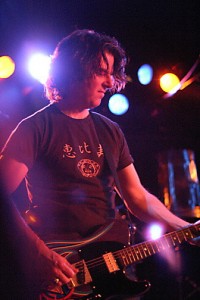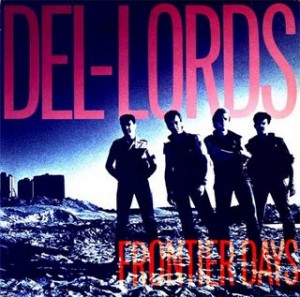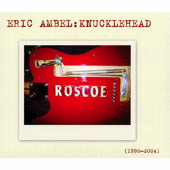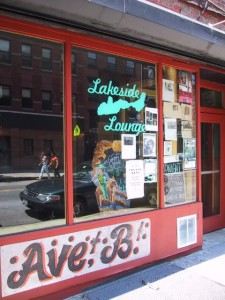 FORWARD: I got to hang out with Eric Ambel, best known as leader of punky ’80s alt-country progenitors the Del Lords, at his tiny Lower East Side pub, Lakeside Lounge, in 2004. He had long since gone solo after playing backup for sundry indie bands. Though often overlooked, the hard-driving rockers he composed for the Del Lords indirectly informed Whiskeytown, the Jayhawks, and Uncle Tupelo.
FORWARD: I got to hang out with Eric Ambel, best known as leader of punky ’80s alt-country progenitors the Del Lords, at his tiny Lower East Side pub, Lakeside Lounge, in 2004. He had long since gone solo after playing backup for sundry indie bands. Though often overlooked, the hard-driving rockers he composed for the Del Lords indirectly informed Whiskeytown, the Jayhawks, and Uncle Tupelo.
Getting settled in the Big Apple could be a daunting task for a genuinely honest individual from America’s rural interior. So it’s quite an impressive achievement when a dedicated Lake Geneva kid conquers the odds by indirectly inspiring a generation of earnest No Depression throwbacks, then running a successful Brooklyn studio and quaint Lower East Side bar while flaunting his wares as a highly respected artist-producer in this prodigious city.
Remarkably, former Midwesterner Eric ‘Roscoe’ Ambel began playing in paid bands at junior high level, moving from heartland Wisconsin to the wondrous ski mountains of Wyoming in ’77 with formative punk outfit, the Dirty Dogs, whose cryptic cult was secured by the single “Sorority Girl.”
“When we first moved there, we thought, ‘this is beautiful, but don’t tell anybody about it.’ We were notorious in our small town,” Ambel recalls. “We’d go to Denver to open for touring punk bands. We exploded after moving to Hollywood.”
As a member of the Accelerators, then Top Jimmy’s pre-Rhythm Pigs combo, Ambel played all the now defunct L.A. hotspots, such as Blackie’s, Starwood, Club 88, and Madame Wong’s, during punk’s ’78 to ’80 heyday.
“I got my Germ burn. It was the ultimate Germs fan gesture – to have Darby Crash burn your hand with a cigarette,” he discloses prior to showing off the faded mark. “I gave him some Oxyn, a high-end pharmaceutical methamphetamine that night. There’s a compilation retrospective that’s got our stuff. Also, we were on the live Urgh! A Music War soundtrack.”
Subsequently, Ambel joined Joan Jett’s Blackhearts for the top selling breakout album, I Love Rock ‘N Roll, then formed cow-punk progenitors the Del Lords with fellow guitarist Scott Kempner.
 Consequently influencing late ‘80s alt-Country icons Uncle Tupelo and their ilk (along with good buddies Jason & the Scorchers), the Del Lords rootsy ’84 debut, Frontier Days, shocked rock’s underground with its great melodic grasp, clean guitar licks, slack harmonic charm, and a thin production someway befitting the lean arrangements. The sturdy “How Can A Poor Boy Stand Such Times And Live” bent old Country poverty sentiments into a revelatory rock setting primordial ‘70s precursors Flying Burrito Brothers, Poco, and the pre-fame Eagles merely touched upon.
Consequently influencing late ‘80s alt-Country icons Uncle Tupelo and their ilk (along with good buddies Jason & the Scorchers), the Del Lords rootsy ’84 debut, Frontier Days, shocked rock’s underground with its great melodic grasp, clean guitar licks, slack harmonic charm, and a thin production someway befitting the lean arrangements. The sturdy “How Can A Poor Boy Stand Such Times And Live” bent old Country poverty sentiments into a revelatory rock setting primordial ‘70s precursors Flying Burrito Brothers, Poco, and the pre-fame Eagles merely touched upon.
“That was a long time ago,” Ambel admits. “I don’t know how far the influence goes. It’s odd. Our first two albums have been out of print for a long time. But as my friend (and frequent collaborator) Lou Whitney (guiding light of facetious corn-poke clans the Skeletons and Morells) used to say, we definitely tested roots rock positive. Those were the dark days of guitar recordings. You couldn’t find anyone who knew how to get a big, loud, clean guitar sound on tape. New York’s best studios weren’t recording bands. They were recording synthesizers and drum machines. It was a lost art with the advent of new wave.”
Nevertheless, aided by Pat Benatar producer Neil Geraldo, ‘86s investigative sophomore outing, Johnny Comes Marching Home, retained its predecessor’s raw verve and tight interplay while augmenting better studio dynamics. The tidy Based On A True Story nearly gained mainstream attention, but the fourth, final, compromised Del Lords album, Lovers Who Wander, Ambel tries to put out of his mind.
 Despite such temporary negativity, Ambel continued to lay down tracks with the Morells, ex-dB’s leader Peter Holsapple, and singer Syd Straw on ‘88s Southern rock-spiked Roscoe’s Gang. Then, he followed this “fun, upbeat party record” seven years hence with mostly different collaborators (including Georgia Satellites pal Dan Baird, Jason & the Scorchers’ Warner Hodges, the Fleshtones’ Ken Fox, and Blood Oranges’ Keith Levreault) for the more serious-minded, guitar-wrangled, Neil Young-indebted Loud & Lonesome.
Despite such temporary negativity, Ambel continued to lay down tracks with the Morells, ex-dB’s leader Peter Holsapple, and singer Syd Straw on ‘88s Southern rock-spiked Roscoe’s Gang. Then, he followed this “fun, upbeat party record” seven years hence with mostly different collaborators (including Georgia Satellites pal Dan Baird, Jason & the Scorchers’ Warner Hodges, the Fleshtones’ Ken Fox, and Blood Oranges’ Keith Levreault) for the more serious-minded, guitar-wrangled, Neil Young-indebted Loud & Lonesome.
Both albums have thankfully been re-released alongside the recent closet-cleaning roundup, Knucklehead, on Ambel’s own Lakeside Lounge Records. Stylistically, these three collections cover wide territory, from grassroots acoustic retreats to full-blown distortion-rattling overloads.
“I don’t want to keep making the same record. I like to mix it up. You don’t have to put the hammer down all the time. If they’re all tall trees, how tall are they? If they’re all loud and fast, what’s the point? There’s nothing to counter it with. If you put that mellow tune on there, all of a sudden you’re ready to explode again,” he surmises.
Bob Dylan’s “If You Gotta Go, Go Now” and funk soul brother Swamp Dogg’s “Total Destruction In Your Mind” get musty barroom treatments on Roscoe’s Gang while Neil Young’s instrumental “Vampire Blues” incurs a sassy Western feel. Eerily reminiscent of the aforementioned enigmatic grunge godfather, Ambel whines and pines in a brooding higher register and cranks up the frazzled wattage when needed for the interrogative respite, Loud And Lonesome. Though its grumpy indictments aimed towards the record biz and possibly the ‘91 Gulf War get hidden beneath the surface, the hard-edged muscle car assault and counteractive semi-acoustic turnabouts truly “have a cloud over them.” And the traditional “Red Apple Juice”, done solo acoustic, hauntingly evokes Young dead-on.
“When I got to the second set, I realized I wanted to write songs I could do solo or with a small band since I didn’t have the money to tour with the Morells on the first. That’s how I got that ‘loud and lonesome’ sound,” Ambel discerns. “Knucklehead, by accident, has a stylistic unity, but it comes from various sources over 14 years of recordings. When I was writing those songs, Terry (Anderson), Dan, and I took little basic tracks, brought them home to put in my cassette 8-track recorder, then added overdubs.”
Blasting forth with spunky spontaneity similar to the Rolling Stones’ roughhewn classic Exile On Main Street, the reliable Knucklehead unfurls several Keith Richard-scoffed axe chords on the honky tonk stinger “Feel So Good,” the fuzz-toned heartbreaker “It’ll Only End In Tears,” and the vibrant Del Lords leftover “Shake Some Action.” Ambel revisits Tom Waits “Union Square” as a piano-based, guitar-etched Blues and gives Steve Earle’s previously unreleased slack lament “The Usual Time” a spiffy whirl. For “Judas Kiss,” formerly an energetic Del Lords anthem, Ambel strips down its rumbling auspices for a funereal laid-back boogie version featuring eminent Country-rock activist Earle on backup harmony.
“That song’s about a guy’s girlfriend becoming a coke whore and dying,” Ambel reflects. “I never thought the up-tempo version fit the words so I slowed it down.”
Earle, meanwhile, has kept Ambel busy as lead guitarist in his band for the past five years; going back to the earthy folk-ensconced Transcendental Blues.
“His new record is coming out in September. It’s called The Revolution Starts Now and it was recorded in his place outside Nashville,” Ambel says.
On top of that, Ambel and associates Baird, Anderson, and Keith Christopher comprise the Yayhoos, who’ve released Fear Not the Obvious awhile back and plan to drop Put the Hammer Down in 2005.
Ambel asserts, “It’s a progression from the first Yayhoos album, which was a songwriter session in a garage we did with six microphones and one little 8-track recorder. It wasn’t intended to be a record. It stayed in the can for six years. It’s pretty brutal. We thought we’d get a crack at the big time and were gonna use it as a demo. We’d do a track, finish writing words together, then we’d redo the thing informally. For the new one, we did a little bit at a time which I find more creative.”
Also, Ambel’s 24-track Williamsburg studio, Cowboy Technical Services, and past production work for the likes of the Bottle Rockets, Freedy Johnston, Nils Lofgren, Blue Mountain, and Chris Harford occupy any remaining time he might’ve had.
“I like to work with good songwriters. I recently worked with a crazy good Springfield, Missouri guy, Jessel Harry,” he boasts.
Interestingly, Ambel played guitar on the Run D.M.C./ Everlast rendition of Steve Miller’s swindling “Take The Money And Run” before hick-hop, by way of Kid Rock, and freshly, Bubba Sparxxx, got insanely popular.
 During a July record release party at his own cozy Avenue B club, the Lakeside Lounge (which he has owned since ‘96 along with former rock writer-d.j. Jim Marshall), Ambel (plus band mates Chip Robinson, Drew Glackin, and James Murphy) verifies his firm grip on original material as well as two George Harrison numbers, the spiritual ballad “Beware Of Darkness” and the frolicsome reverb gambol “Wah Wah.”
During a July record release party at his own cozy Avenue B club, the Lakeside Lounge (which he has owned since ‘96 along with former rock writer-d.j. Jim Marshall), Ambel (plus band mates Chip Robinson, Drew Glackin, and James Murphy) verifies his firm grip on original material as well as two George Harrison numbers, the spiritual ballad “Beware Of Darkness” and the frolicsome reverb gambol “Wah Wah.”
A standing room only crowd of sixty witness the event while people peering in through the backroom window and glass emergency exit door watch curiously from the street as they walk by to see who’s making that infernal racket. Directly following this 75-minute show, he prepares to head for the road, stopping in Durham, North Carolina a week later, where I’ll once again catch this subterraneous legend doing another delightful gig.
So what’s the future hold for Roscoe’s Gang?
“I’m working on some stuff. That’s part of the reason I got Knucklehead out – to clear the slate,” he offers. “The songs dictate what the next album will be like. I truly enjoy playing with the guys I’m using now.”
-John Fortunato
xxxxxxxxxxxxxxxxxxxxxxxxxxxxxxxxxxxxxxxxxxxxxxxxxxxxxxxxxxxxxxxxxxxxxxxxxxxxxxxxxxxxxxxxxxxxxxxxxxxxxxxxxxx